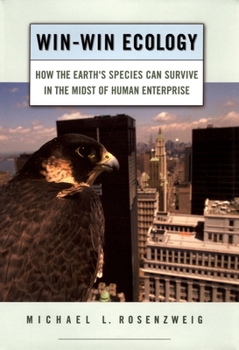Win-Win Ecology: How the Earth's Species Can Survive in the Midst of Human Enterprise
"In thoughtful and elegant prose, peppered with humor and bits of philosophy, Rosenzweig presents...a hopeful, fresh vision.... The book is a wonderful source of motivation and inspiration, entertaining and thought-provoking for lay and professional audiences alike. Even the most skeptical readers will likely be convinced of the need to rethink conservation strategy." --Science
Format:Hardcover
Language:English
ISBN:0195156048
ISBN13:9780195156041
Release Date:April 2003
Publisher:Clarendon Press
Length:224 Pages
Weight:1.12 lbs.
Dimensions:0.9" x 6.3" x 9.7"
Customer Reviews
2 ratings
A Clarion Call For A New, Most Unique, Approach to Saving Earth's Biodiversity
Published by Thriftbooks.com User , 15 years ago
One of our most brilliant, thoughtful, and persuasive, ecologists, Michael Rosenzweig has looked at virtually every major facet of ecology over an illustrative career spanning more than four decades, focusing primarily on evolutionary, population and community ecology. This tremendous range, from studying continent-wide species diversity patterns to understanding community ecology in the surrounding Sonoran (Arizona) desert, and finally, to interpreting major aspects of the fossil record from an ecological perspective, has led to the development of important, often novel, insights not only in ecology, but indeed, for much of evolutionary biology. For example, in the early 1970s, independently of evolutionary biologist Leigh Van Valen (who would coin the term), Rosenzweig stumbled upon the Red Queen's Hypothesis. In his latest book, "Win-Win Ecology", Rosenzweig is a most infectious optimist, arguing persuasively for a new kind of conservation ecology, reconciliation ecology, that, by striving to strike a balance between humanity's demographic and economic pressures and the desire to save as much of Earth's biodiversity as possible, may become ultimately, the best - if not the sole - means of saving this biodiversity. Rosenzweig passionately believes it is possible for humanity to live in harmony with nature. Moreover, he offers elegant proof that it is being done now, beginning with a most memorable vignette; discovering an "undersea" restaurant at the Israeli Red Sea port of Eilat, whose adjacent reef has been constructed, offering a new refuge to the port's exceedingly rich coral reef biodiversity. Other memorable tales include the inadvertent construction of sanctuaries for native frogs in southern Arixona courtesy of cattle ranchers, for crocodiles at a Florida power plant, and for a pine forest at a United States Air Force weapons testing range. For Rosenzweig, these, and other notable examples he cites, demonstrate how the science of reconciliation ecology would work; a new form of conservation ecology in which mankind would construct new, artificial habitats to preserve some, if not all, an area's existing biodiversity. Most conservation biology efforts, Rosenzweig notes, fall under reservation ecology: "save the Earth's habitats", with increasing attention also drawn to restoration ecology: restoring some territory back to a more natural status. But he believes both are ultimately doomed to fail if they are the only means of preserving Earth's biodiversity. For both purely esthetic and selfish economic reasons like ecotourism, Rosenzweig believes that reconciliation ecology may prove to be more effective than reservation ecology and restoration ecology (But he also recognizes that we shouldn't throw out the baby with the bath water; that both reservation ecology and restoration ecology will still have ample importance in preserving our planet's still rich biodiversity.). Most of the latter half of "Win-Win Ecology" is devoted to the sci
Inspiration amidst depression.
Published by Thriftbooks.com User , 21 years ago
This book inspires you to look at your surroundings and make changes that improve the welfare of the living world around you. However, it states the cold equations of our increasing destruction, and explains what the future is likely to bring if we don't immediately start working for a better world. Plants and animals used to be able to move to new habitats during periods of climate change -- today we've locked them into too-small reserves and they have nowhere to go except extinct during the current warming trend. That's why we must work hard at making our cities (where most of us live) as hospitable as possible for other living creatures.





